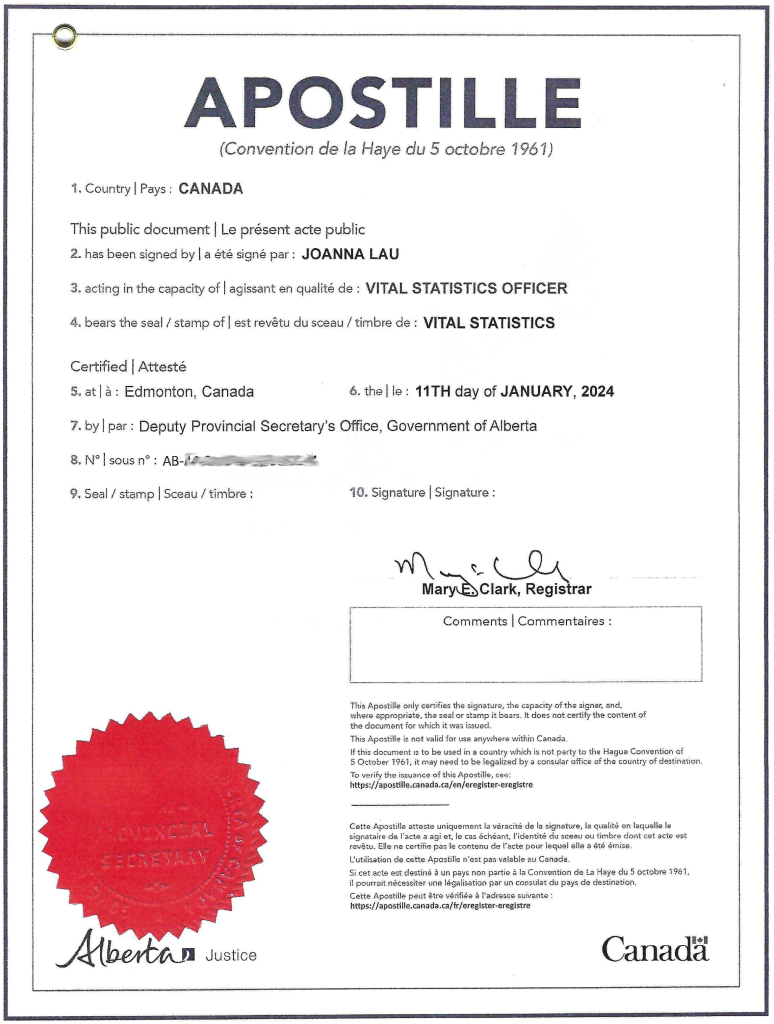Alberta Apostille Services
The integration of Canada into the Hague Apostille Convention marks a significant shift in the process of document authentication and legalization. This change, particularly impactful for Alberta, simplifies the verification of documents for international use, heralding a new era of global document exchange. The Authentication Office of the Ministry of Justice of Alberta has been designated as a competent authority for the Apostille of all documents originating within the province. This development is a boon for individuals and businesses alike, necessitating an experienced guiding hand in navigating this new landscape.
The Importance of Apostille in Alberta
An Apostille is an internationally recognized form of certification that authenticates the origin of a public document. In Alberta, the range of documents requiring an Apostille is diverse, catering to various personal and professional needs. Common examples include:
- Birth, Marriage, and Death Certificates: Essential for personal matters such as international marriages, citizenship applications, or overseas family matters.
- Educational Documents: Degrees, diplomas, and transcripts needed for studying abroad or for international professional qualifications.
- Corporate Documents: Articles of incorporation, commercial invoices, and power of attorney, crucial for international trade and business transactions.
- Legal Papers: Court documents, affidavits, and notarial acts, necessary for legal processes across borders.
The Apostille ensures that these documents are recognized as valid in all other member countries of the Hague Convention, eliminating the need for further legalization by the embassy or consulate of the destination country.
Global Document Solutions: Your Trusted Partner
Global Document Solutions, with over thirty years of experience in document certification in Alberta, is ideally positioned to assist with the Apostille process. Our deep-rooted expertise, combined with service centers strategically located in Calgary and Edmonton, makes us a premier choice for individuals and businesses in Alberta.
Why Choose Global Document Solutions?
- Expertise and Experience: Our team has extensive knowledge of the intricate details involved in the Apostille process, ensuring a smooth and efficient service.
- Convenience: With service centers in both Calgary and Edmonton, we are easily accessible to our clients across Alberta.
- Tailored Services: Understanding that each document and situation is unique, we offer personalized solutions to meet specific needs.
- Time-Saving: Our established processes and connections within the Ministry of Justice streamline the Apostille procedure, saving valuable time for our clients.
- Peace of Mind: Our track record of handling sensitive documents with confidentiality and care provides clients with the assurance their documents are in safe hands.
FAQs
- What is the Hague Apostille Convention? The Hague Apostille Convention is an international treaty that simplifies the process of authenticating public documents for use across national borders.
- What changes will occur with Canada joining the Hague Apostille Convention? The most significant change will be the simplification of the process for authenticating documents for international use. The Ministry of Justice of Alberta's Authentication Office is now a Competent Authority to issue Apostilles.
- How does this impact the citizens and foreigners in Canada? The change streamlines the authentication process, making it faster and more efficient for both citizens and foreigners in Canada.
- What are the potential challenges of this transition? The transition could bring about challenges like delay and confusion as the competent authorities adjust to the new procedures and ensuring everyone complies with the new processes.
- What is the role of the Ministry of Justice of Alberta in this? The Authentication Office of the Ministry of Justice of Alberta has been designated a Competent Authority to issue Apostilles under the new system.
- What will the new Alberta Apostille Certificate look like? Below is an example of what the new Alberta Apostille Certificate will look like.

Conclusion Trust The Experts @ Global Document Solutions
The accession of Canada to the Hague Apostille Convention, with Alberta at the forefront, represents a significant advancement in document authentication. As the process evolves, the expertise of Global Document Solutions becomes ever more vital. With our unparalleled experience and commitment to service excellence, we are not just a service provider but a partner in your international endeavors. Trust us to navigate you through this new era of document authentication with ease and confidence.

